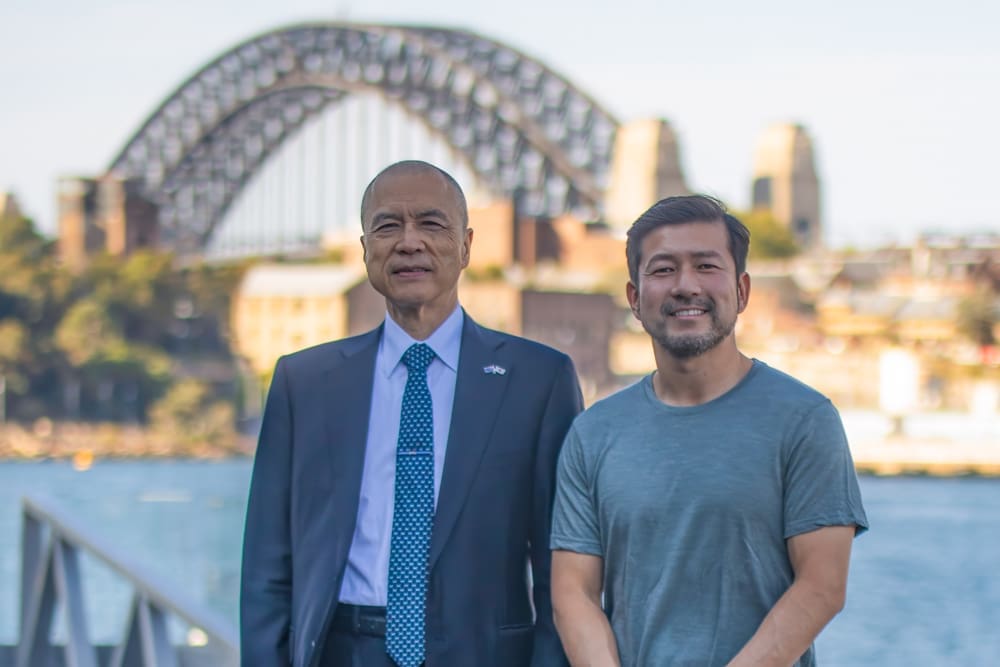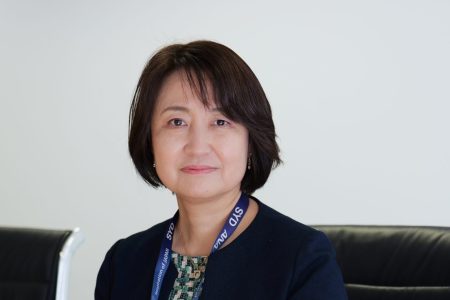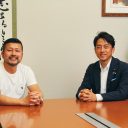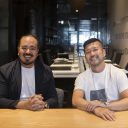In Conversation Vol.28

In this ongoing series, Yoshinori Sakuno, founder of Japanese cross-cultural marketing company doq®, and currently Chairperson of Nichigo Press, engages in a dialogue with key figures in Australia-Japan relations and business. This time, we have invited Michiaki Hirose, who served as president and CEO of Tokyo Gas and has been involved in the gas industry for many years. He is currently chairman of the Tokyo Metropolitan Public Safety Commission, and chairman of the Japan-Australia Business Co-operation Committee.
(Photography: Satoko Clark, Translated from Japanese by Sachi Kobayashi)
PROFILE

Michiaki Hirose
Joined Tokyo Gas Group in 1974. After serving as executive officer, he was appointed vice president in 2012 and president and CEO in 2014. He led the company through the liberalisation of Japan’s gas retail market, instrumental to the growth of the industry, and in 2018 was appointed both chairman of the Board of Directors and chairman of the Japan Gas Association. He stepped down in 2023 and has served as chairman of the Tokyo Metropolitan Public Safety Commission since 2022. In the spring honours of 2023, he was awarded the Grand Cordon of the Order of the Rising Sun in recognition of his long-term commitment to the development of the gas industry, and his many contributions to the industrial economy.
PROFILE

Yoshinori Sakuno
Founder and Group Managing Director of doq®. After gaining experience in the APAC and Western markets at the U.S. advertising agency Leo Burnett, he founded doq® in 2009. He holds an MBA from University of NSWs AGSM and a master’s degree in Digital Media Management from Hyper Island Singapore. He was a finalist for the “Ethnic Business Awards” that honour immigrant entrepreneurs and received the 2021 NSW State Export Award for the Creative Industries sector’s Best Company.

Sakuno: What challenges and opportunities do you see in the current state of economic relations between Japan and Australia?
Hirose: Personally, I think that Australia is an irreplaceable, truly important partner for Japan. Since the post-war period, we have shared strong economic ties that have evolved into a mutually complementary relationship, particularly in the energy sector. Looking ahead, energy will remain essential, but I believe that we can also collaborate in new fields, such as in the IT, medical technology, and space industries.
Last year marked the 60th anniversary of the Japan-Australia Economic Conference. The past 60 years have been focussed on strengthening Japan-Australia relations. Up until this point, the conference has always emphasised the energy sector but moving forward, we need to expand and build relationships in those additional fields. In the future, we will likely face various difficulties and challenges, such as further environmental issues, so it is essential that the two countries continue to cooperate and contribute to sustaining international order. Japan and Australia do also have cooperative relationships with Indo-Pacific nations , but we must work on developing these even further. While it may have previously been enough to consider only a bilateral relationship, from now on we need to think about what the two countries can achieve together as we usher in a new era.
Sakuno: As you say, up until now trade and resources have been the focus, but moving forward, we are entering a new phase of cooperation in various fields, such as the service, innovation, technology, and human resource industries. In particular, Japan will have to face a shortage of human resources in the future, so I think Australia’s multicultural society and diverse culture will be valuable as a reference for Japan.
Hirose: That’s right.

Difficult experiences in youth and work experience in the labour union shaped his career development
Sakuno: What experiences and ways of thinking from the early stages of your career do you think influence your current leadership?
Hirose: Maybe I can say this now. When I was young, I experienced a lot of hardships and difficulties, and although it was tough at the time, I think that those experiences were useful in my later life. I joined Tokyo Gas in 1974, and was assigned in my first year to a conversion facility called “conversion hell,” which used liquified natural gas (LNG) to increase the calorific value of gas. As a new employee, I was thrown into a department where many young people quit. There were almost no senior colleagues, and I was so busy that I always went home by taxi in the middle of the night. Due to my nature as a perfectionist with a strong sense of responsibility, I felt mental anguish over feeling as though I hadn’t achieved anything in my first year, and even considered quitting the company. I envied my classmates who worked in more established departments such as sales offices and factories. I wondered why only I, amongst 1,500 young employees, was assigned to a department that was just three years old. Looking back now, I feel that it was a valuable experience, as since then, no matter what happens, I don’t feel like the feelings of difficulty or stress compare.
After that position, I was assigned to the field, and a distinctive part of my career was that for eight years, I worked exclusively for the labor union, receiving a salary from union dues from members, rather than from the company. There, I worked on organisational management, developing ways to answer dilemmas such as how to build consensus among people, how to consolidate various miscellaneous opinions into a single demand, and how to absorb people’s feelings and opinions and reflect them into management decisions. As I look back, my eight years of experience in the labor field was, in a way, quite similar to experiences in upper management. A lot of it came down to figuring out how to consolidate various opinions and ideas into one. When I was young, I went through all kinds of experiences, including these ones. At truly desperate times I thought about quitting the company, but I’m glad I didn’t. Although I think that it can sometimes be worthwhile to push through tough times, in this emerging age, it might be okay to leave a company if things become too difficult. Back then, Japanese society largely had a lifetime employment system, which meant that switching companies was somewhat taboo. Now it’s different, so moving on quickly may also be a good option to consider.
Sakuno: For eight years, working for the union, you experienced the position of someone looking at the company through the completely opposite perspective to a leader like yourself, today. Having seen things from “the other side” must have been a very valuable experience in developing your leadership skills, don’t you think?
Hirose: Yes, indeed. At the end of the day, the goal is the same – to improve the company. Naturally, from a slightly different viewpoint, the union must express opinions about management, and at times, bring a different way of thinking to the company. In that sense, being able to see into management at a young age was an extremely valuable experience. From the union side of things, beyond matters of negotiating treatment, it was one of my responsibilities at the time to speak out on management issues. Amongst other tasks, I was also to hear various things about business policy and convey them to the union. I got to understand and interpret managements perspectives in a different way. Then, after working for the labor union for eight years, I was assigned to the central Corporate Planning Department.
Sakuno: That’s a 180-degree turn, isn’t it?

Hirose: Yes, it is. I had no idea where I would be assigned after the labor union, but even so I was surprised to find out that I was placed in Corporate Planning, and I thought, “Our company does bold things.”
Sakuno: It shows the company’s capacity, doesn’t it? Imagining, of course, that the management did this intentionally.
Hirose: In the Corporate Planning Department, I would take notes at management meetings where the executives made various company decisions, and it was one of my responsibilities to coordinate the agenda. I experienced how executives discuss matters and the process by which company policies were determined. I think that it was ultimately beneficial to have that experience, and to be allowed to handle various things, in my thirties.
Sakuno: Personally, I feel that you, Mr Hirose, are now a very easy-going person, but I can imagine that you were strict when you were young. Does that ring true?
Hirose: That may be the case, but it still takes me quite a while to be persuaded. I make it a habit to ask “why?” three times. Even if an answer is given, I repeat, asking, “Why is that?”. By asking why, the person explaining gains an opportunity to expand their ideas as they reflect or repeat their explanation. I used to repeatedly ask “Why?” because I really had more that I wanted to know, but nowadays, even if I roughly understand what the answer is likely to be, I consciously make a point to ask questions.

My career has been shaped by the people I’ve met along the way
Sakuno: When you were young, did you have any values or goals that you were conscious of, especially in your career?
Hirose: For many years, I worked in departments involved in planning and decision-making, and during that time, I particularly valued the principle of “logic.” I adopted it as follows.
Things that were not thought out and didn’t follow logic, no matter how attractive they may seem, should be avoided. A bad decision may work out temporarily, but it will always come at a price later. If you take a short-term measure, it will always backfire, so I believe we should avoid compromising for the sake of immediate results. When encountering a proposal that lacks logical thinking, it’s important to focus on how it can be improved. If it proves impossible to rectify, we must abandon that proposal. Even now, there are times when I listen to something and think, “This doesn’t have good reasoning,” but the challenge then becomes how to respond to it.
Strangely, I don’t dislike it when the company faces crises or troubles. I often feel more motivated when problems arise than when things are going smoothly. When I was president, challenges arose one after another, but I held a broad perspective and thought about how to keep problems small. I particularly liked risk management, and when a problem occurred, I immediately set up a task force, shared information with everyone, and discussed options for resolving the issue. Risk management is about identifying problems when they are small, and preventing them from growing big, and I greatly value this method. Of course, I don’t create risks for myself just to solve them, like the so-called “match pump” where one starts a fire just so they can put it out themselves. However, in organisational management, periods of solving risks and challenges are more common than periods of smooth sailing. No matter how many ideas and thoughts are excellent, unless their accompanying risks and problems can be resolved, progress cannot be made. Management, in a sense, is risk management itself.
Sakuno: Is there a major crisis that you can talk about now?
Hirose: Yes. When I was an on-site manager, there was a gas explosion accident. It happened at a restaurant that I was in charge of, and while there were no fatalities, many people were injured. For about a year afterward, I was unable to focus on what you would call suitable work. The entire organisation investigated the cause of the accident, coming up with improvement measures, addressing those who were injured, and I was reminded that we must never allow such an accident to happen again. When we take various measures to prevent accidents from happening, there are times when you question “Is it really necessary to go to such lengths?” especially if nothing ever happens. However, after experiencing an accident, I deeply realised the importance of ensuring precautionary measures are in place, even if it incorporating them feels like a detour.

Sakuno: What advice or lesson have you received that has made the greatest impact in your career so far?
Hirose: Since joining this company, I have observed many people’s words, actions, ways of speaking, and ways of greeting others. There isn’t specifically a “one,” but among those working on the ground, there were several people who weren’t necessarily great speakers but possessed a talent for drawing people in. I felt that the other staff naturally began to emulate the behaviour of these people. So, for me, career isn’t just about work experience, it’s also about seeing different people differently, and listening to their stories. I feel that my own career has been shaped by others.
Sakuno: I see. I’ve always felt that, as a leader, you place more importance on your relationships with people and understanding them than on the content of the work itself. So, hearing you say that your career has been shaped by people around you makes perfect sense to me.
Hirose: Of course, when we talk about a career, we often mean the temporal accumulation of experience such as “I did this job from this year to that year,” or “I was involved in this project during this period,” but for me, that is not the only definition of a career. Rather, I feel that the relationships and connections with various people I have met along the way are what make up my career. Therefore, it’s not something I can explain simply.
Information sharing and people-to-people exchanges are key to the development of Japan-Australia relations
Sakuno: How do you predict the business relationship between Japan and Australia to change in the next ten years?
Hirose: As the chairman of the Japan-Australia Economic Committee, one of my important responsibilities going forward will be to promote economic cooperation between Japan and Australia. Of course, Japan needs to maintain and strengthen relationships with many countries around the world, but I believe that we must build an even deeper cooperative relationship with Australia in particular. About two years have passed since I became chairman, and every time I visit Australia and speak with Australians, my understanding and affection for this country and its people deepens. Moving forward, to further develop the relationship between Japan and Australia, I believe that there are two key steps to be taken.
First, the sharing of information. In Japan, there is very little information coming from Australia. Many Japanese media outlets have withdrawn, and the only one remaining in the market is the Nihon Keizai Shimbun (Japanese newspaper), Similarly, in Australia, there is a lack of information about Japan. I feel that the role of media is becoming increasingly important to fill this gap. For our generation, traditional media, such as newspapers, are still vital sources of information. Therefore, I have been requesting that newspapers like the Asahi Shimbun and the Yomiuri Shimbun refocus on international affairs, and resume sending information between Japan and Australia. To strengthen the relationship between the two countries, it is essential that they share information across various fields such as politics, economics, and society.
The second important factor is the exchange of people. According to last year’s statistics, about 600,000 people visited Japan from Australia, while only 300,000 people went from Japan to Australia, so there is an imbalance. I feel that it is necessary to improve this situation and further facilitate people-to-people exchanges between the two countries.

Sakuno: It has been said that the number of visitors from Australia to Japan this year will exceed one million.
Hirose: As was clear from last year’s statistics, the number of visitors from Australia to Japan is on the rise. This is important, but what is more important is that exchanges between the younger generation become more active. We are working hard to achieve this, and I hope that in the future, exchanges between young people increase even further. In the past, young people from Japan frequently visited Australia for language training, but recently this number seems to have decreased. It’s not clear whether this is because Australia’s appeal has diminished, or if there is another reason, but it could be that there is an issue where even those who visit for a working holiday are unable to find work. It has been reported in the media that some Japanese people visiting Australia on working holiday visas are encountering difficulties finding work. Still, I think it’s wonderful that the Japan-Australia Economic Conference has set up forums for discussions with young people. Opportunities like these to deepen exchanges amongst the younger generation will strengthen the friendly relationship between Japan and Australia.
Additionally, in the area of Diversity, Equity, and Inclusion (DEI), I feel that there is a lot that Japan can learn from Australia. Australia is very advanced in this field, and Japan should deepen its learning on the topic. In terms of awareness of this topic, the Japanese business world may have made some recent progress, but the systems and mechanisms in place, and their results, remain insufficient. In this regard, I think that there is much to learn from Australia. Of course, there are still some issues related to DEI in Australia as well. There may be parts of this discussion that cannot be resolved in a single sweep, but this topic has been raised as a theme every year, and I hope that at the Japan-Australia Economic Conference we can expand the discussion, from economic issues, to include these social issues too.

The strength of an organisation is determined by its ability to embrace diversity
Sakuno: What do you think are the reasons for Japan being behind in terms of women’s social advancement, and what can be done to promote it more?
Hirose: In business, especially within companies, there are many social issues to discuss, but I feel that there are particularly noteworthy points regarding the active involvement of women. It has always been my belief that it is important not to treat women differently but to actively provide them with opportunities to gain experience. Previously, there has been some hesitation towards women, but from my experience, it is necessary to give women more opportunities and allow them to gain experience. In fact, I often hear from women aiming for career advancement say, “I wish I had been entrusted with more responsibility in my twenties.” In my company, there are three female executives, and they too seem to feel that they would have liked to gain more experience when they were younger. This may be due to the fact that because they were women, they were given special treatment, and as a result, they were not given the same opportunities that men typically experience at a young age.
By gaining such experience, the scope of a woman’s career expands, and her growth as a talent is promoted. Of course, there may be people who think, “Such experience is not necessary,” but considering the long lives are women, there are women who will enter the home, and women who will balance work and family. For this reason, I believe that women should be given equal opportunities for experience, just like men. I may be in the minority, but I believe that Japan should introduce a quote system and establish certain positions specifically for women. In New Zealand and in some Scandinavian countries, such systems have proven to be effective to a certain extent, and perhaps they are necessary in Japan as well. DEI includes not only gender, but also diversity in age, nationality, and race. Japan is not yet a society with as much diversity in nationality and race as Australia, but I believe the need for such diversity will increase in the future. Japan tends to favour homogeneity, but I am of the opinion that diversity within chaos, or rather within chaotic situations, is a strength.

Sakuno: That’s how new ideas are born.
Hirose: I like chaotic situations. It is difficult to organise them and change existing frameworks. However, I feel that it is actually easier to build an organisation in a chaotic state. The key is to explain a chaotic situation in a logical manner, and convincingly lead people to a unified understanding. I call myself an “organisational expert.” I have worked in accounting, but ultimately, my role is to figure out how to organise the company. When it comes to organising a group of people, I often use soccer as an example. Japan traditionally emphasises “teamwork,” but in reality, such teamwork is only possible when each individual has mental and physical strength. First the strength of each individual serves as the foundation, and then together, they form a team. However, in Japan, because “teamwork” is assumed from the very beginning, individual strength tends to be overlooked. In reality, a team is a collection of individual strengths, and its diversity should be its strength. The strength of an organization is determined by its ability to embrace diversity and bring together these different individuals.
Sakuno: You’re absolutely right. For example, in soccer, it would be unreasonable to suddenly ask a goalkeeper to play the role of a forward. The goalkeeper has the role of being the key to defence, and the forward is required to have the ability to attack. It is precisely because each individual’s skills, mindset, and physiques are different that the team’s strength is exerted. However, in Japan’s “teamwork” approach, there is a strong sense of everyone deciding and doing things together, and I feel that there is a tendency to neglect individual skills.
Hirose: My company also used to have a culture that emphasised uniformity and standardisation. However, now diversity is valued, and a diverse talent is thriving. Even so, it is not easy to bring together diverse individuals. Without a strong core, it is difficult. If done poorly, there is a danger of creating a group without any distinctive characteristics at all. There is, however, also the possibility that different types of people interacting will create a chemical reaction and give way to a stronger organisation. I believe that such an organisation is preferable.
Sakuno: Lastly, do you have a message for the readers of Nichigo Press?
Hirose: Going forward, in order to further strengthen Japan-Australia relations, it is important to know how to provide information to people who do not know much about each other’s countries and get them interested. Of course, it is great to have people who already like Australia involved, but we need to reach out more widely to Japanese people who cannot speak English and Australians who cannot speak Japanese. Otherwise, we will end up with a small circle that only involves a few people. I hope that in the future, we create a wider range of activities and increased opportunities for the people of both Japan and Australia to better understand each other. I hope I can contribute, even if only in some small way, to that effort.
Sakuno: Indeed, communication and exchange between people is key. Thank you very much for today.
(September 9th, in Sydney)













